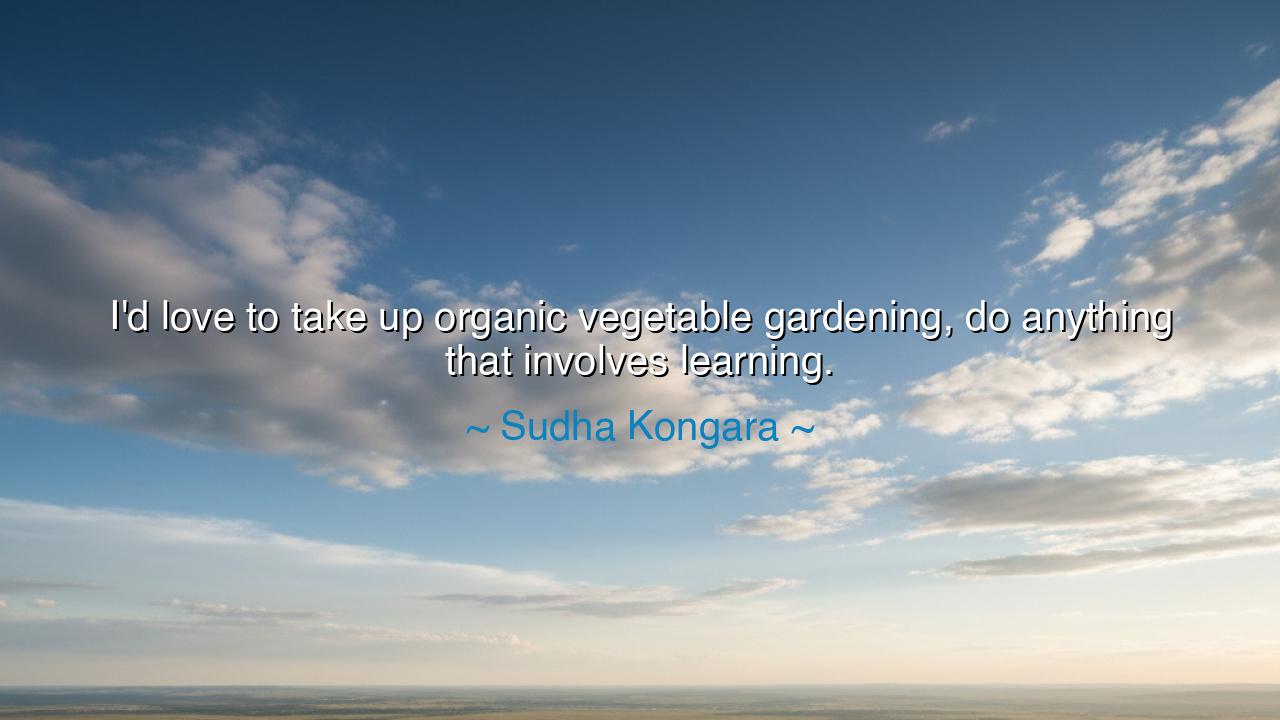
I'd love to take up organic vegetable gardening, do anything that






Hear, O children of wisdom, the words of Sudha Kongara, who speaks of the joy of learning and the noble pursuit of growth: "I'd love to take up organic vegetable gardening, do anything that involves learning." In these words, Kongara touches on a profound truth that has been spoken across the ages: that the desire for knowledge and the act of learning are at the heart of human fulfillment. Gardening, especially organic gardening, is not just a practical endeavor, but an act of engagement with the cycles of nature, a living classroom where we learn not only about plants, but also about ourselves and the world around us.
In the ancient Greek tradition, philosophy was considered the highest form of learning—a journey that was not just intellectual, but also practical. Socrates, who spoke of the importance of constant questioning, taught that true wisdom lies not in the answers we find, but in the questions we ask and the pursuit of knowledge itself. The journey of learning is a lifelong quest, where every experience, every new endeavor, teaches us something deeper about the world. Kongara’s yearning for organic gardening is a reflection of this ancient truth—the desire to learn through engagement with the world, to understand its mysteries and rhythms, and to connect with nature in a way that nourishes the soul.
Consider, **O children, the life of Leonardo da Vinci, a man whose insatiable curiosity led him to explore a multitude of fields: from art to science, from anatomy to engineering. Da Vinci understood that learning is not a solitary pursuit, but an active engagement with the world. His notebooks are filled with sketches of plants, animals, and inventions, as well as his profound questions about the natural world. He believed that the pursuit of knowledge was not limited to one domain, but should be a holistic engagement with life itself. Kongara’s desire for gardening reflects this same spirit of continuous learning—an acknowledgment that every act, whether in gardening or any other pursuit, is an opportunity to connect more deeply with the mysteries of life.
In the ancient traditions of India, the Brahmins—those learned scholars—sought to live lives of wisdom and knowledge, not through theoretical study alone, but through practical engagement with the world. They believed that true wisdom was gained not only through study but through the integration of knowledge into everyday life. The practice of organic gardening, in this light, is not a pursuit limited to growing food, but a spiritual practice where the gardener learns the rhythms of the earth, the cycles of life and death, and the interconnectedness of all things. Kongara’s wish to learn through gardening connects her with this ancient wisdom—where gardening becomes not just a task, but a sacred engagement with the natural world.
Consider also the example of George Washington Carver, whose work in agricultural science revolutionized farming practices in America. Carver, a man of profound curiosity and humility, believed in the power of learning through nature. His work with peanuts and crop rotation was not born out of theory alone, but from observing the land, learning from it, and engaging with it in meaningful ways. Carver’s life exemplifies the principle that true learning comes not from books alone, but from direct interaction with the world. Just as Carver learned from the earth, Kongara’s desire to learn through gardening reflects the timeless principle that knowledge is most powerful when it is integrated with action, when we apply our understanding to the world around us.
The lesson here, O children of wisdom, is that the desire for learning is not simply a thirst for information but a deep call to engage with the world. Whether through gardening, reading, or any other pursuit, we are called to immerse ourselves in activities that nurture both the mind and the spirit. Learning is not a passive endeavor—it is an active engagement with life. Each moment, each new experience, whether it involves planting a seed or reading a book, is an opportunity to connect more deeply with the mysteries of existence. In this sense, every act of learning is sacred, and every new endeavor is a way to grow closer to the truths that govern the world.
So, O children, remember the power of learning through engagement. Do not wait for knowledge to come to you; seek it out in the world around you. Whether you take up gardening, cooking, or any other endeavor, know that each new pursuit is a step toward greater understanding. Allow yourself to be led by curiosity, and know that every action has the potential to teach you something new. Learn from nature, from people, from experiences, and from your own mistakes, for true wisdom lies in the willingness to engage, to ask questions, and to learn from the world around us. May you always find joy in the process of discovery, and may your life be a journey of learning, in everything you do.






AAdministratorAdministrator
Welcome, honored guests. Please leave a comment, we will respond soon